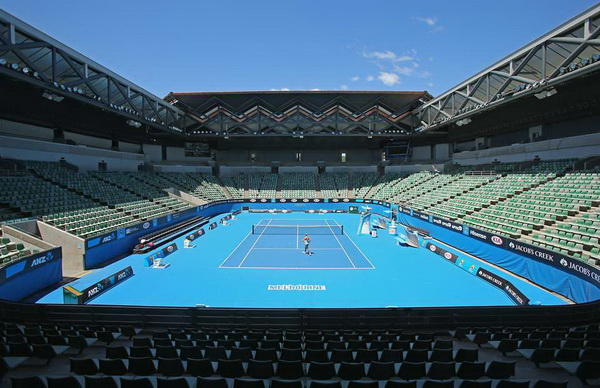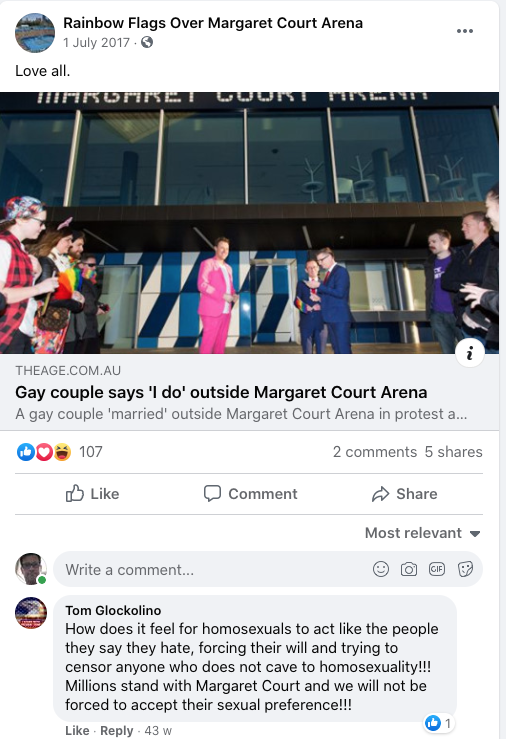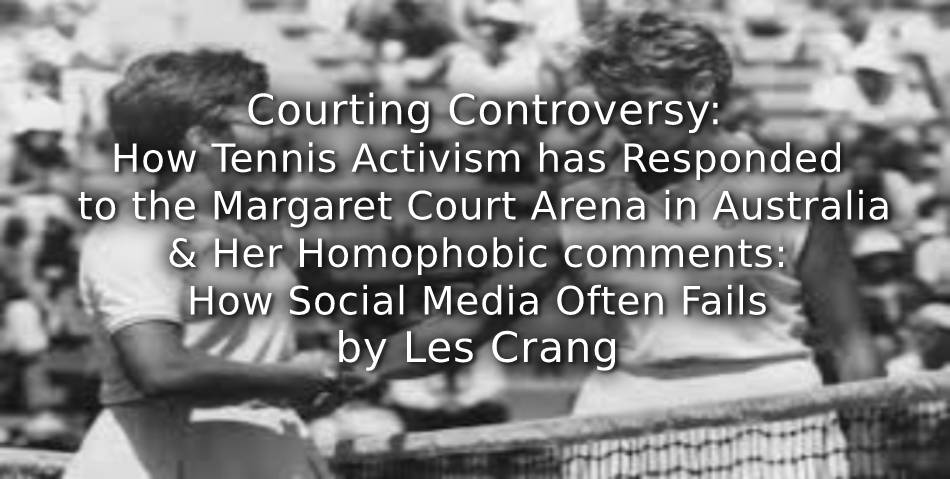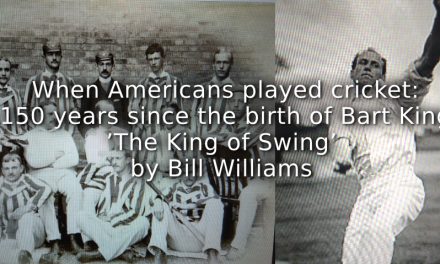Margaret Court’s 24 Grand Slam tennis titles still stands as a record. Her title wins came over the period 1960 to 1973 (12 in the Amateur era of 1960-8, half in the Open period of 1968-73). Since retiring from tennis in 1977, she has become an independent Pentecostal minister in 1991 (Baxter, 2007) and in 1995 created Victory Life Centre which describes itself as:-
A family church in Perth that exists to train you to know who you are in Christ. (Victory Life Centre, 2020)
It’s comments like ‘tennis is full of lesbians’ and an belief that she feels ‘the impact on children of a free society has led them to question their gender , something she feels is going against Biblical doctrine’ (see videos below) has brought her into conflict with many tennis players and fans.
Court has also said in 1990 of Martina Navratilova :-
(Navratilova) is a great player, but I’d like to see somebody at the top to whom the younger players can look up to….It is very sad for children to be exposed to (homosexuality).
Martina is a nice person. Her life has just gone astray. (Margaret Court Rips Navratilova as a Role Model, 1990)
Navratilova responded by saying of Court:-
“It’s just unfortunate because I think what Margaret Court doesn’t realize is how many people she hurts with her rhetoric,” Navratilova said Monday, before the anniversary ceremony. “She can believe whatever she wants but she’s actually hurting people and that’s not OK.” (Press, 2020)
Court’s speeches mentioned previously and comments on the Australian airline ‘Qantas’ in 2017 after they supported same-sex marriage in the Australian referendum in 2017 and her not willing to use them if at all possible (“Margaret Court vows to stop flying Qantas over marriage equality stance”, 2017) has added to her profile and the naming the Arena to be changed.
Due to her standing as an Australian Tennis champion, in 2003 the Australian Tennis Championships’s ‘Show Court 3’ in Melbourne was renamed ‘The Margaret Court Arena’ (“History – Margaret Court Arena”, 2020). This has created much controversy after the comments above – and others. For example, Billie Jean King said she would refuse to play on the court (Briggs, 2018), and Martina Navratilova and John McEnroe unveiled a sign on the court advocating for it to be renamed the ‘Evonne Goolagong Arena’ (Fraser, 2020).

This has brought Court into contention with people who do not share her opinions or persons of lesbian, gay, bisexual, or transgender (LGBT) rights.
In this blog post I will look at how social media has, to some degree, been instrumental in fulminating against the Margaret Court Arena but not really obtained traction in getting the Arena name changed. I will also look at how Evonne Goolagong has been utilised as an example of inclusivity within Australian culture and whether this has been successful. I will also look at the problems with these social media campaigns and especially the idea of what is termed ‘slacktivism’ (Chatfield, 2011). Margaret Court has responded to these campaigns and how past legends of the sport have illuminated her homophobia. The blog will also look at how issues around what a national tennis centre chooses to call itself has become a fulcrum of activism.

The Margaret Court Arena.
As early as December 2011 Rainbow Flags Over Margaret Court Arena Facebook page had been created, with the stated aim as:-
To provide peaceful, non-disruptive support for the gay community by inundating MCA with rainbow flags during the Australian Open. (Johnson, 2011)
The 2012 Australia therefore started with people bringing the rainbow emblems to the court. Resulting in :-
Laura Robson and Martina Navratilova to wear rainbow-themed clothing during their matches, and also compelled Court and Navratilova to post full-page responses directed to each other in the leading Melbourne newspaper, the Herald Sun. (Tredway, 2019)
Although the success of the use of flags and rainbow themed clothing were seen by many in the Arena, mainstream media coverage during the Martina Navratilova doubles match did not discuss it at all in its match reports (Leach, 2012).
Tredway’s (2019) excellent article ‘Rainbow Flags Over Margaret Court Arena’ points out :-
Fans participating as social movement actors at sporting events is not new. Davis-Delano and Crosset (2008) conducted a qualitative study of two groups of fans – those who protested the funding of public sports facilities and those who protested the use of American Indian mascots in sport.
The strength of the case can be seen that the Arena has asked to be renamed the Evonne Goolagong Arena via an online petition, which stated aim was:-
Evonne Goolagong, who was ‘Australian of the year in 1971’, is also a great Australian tennis champion. She has a reputation for generosity and inclusiveness. She is a far more suitable candidate for the official name of your stadium. (Campbell, 2016)
Ironically, the impact of these social media campaigns meant that Margaret Court Arena did prematurely get renamed the ‘Evonne Goolagong Arena’ by Google Maps (Healy, 2017). The petition again had a positive reaction with Navratilova saying:-
I think the Evonne Goolagong Arena has a great ring to it. Now there is a person we can all celebrate. On every level. (Munckton, 2017)
The problem with online activism such as this is what is termed ‘Slacktivism’. Which is a form of what White termed ‘clicktivism’.
This tendency, White [2010] argued, is characterised by an ‘obsession with tracking clicks’ and by the uncritical assumption ‘that the tactics of advertising and market research used to sell toilet paper can also build social movements’. True activism, White argues, involves real passion, real risk, real human connections and a deep suspicion of corporate marketing-style tactics. (Chatfield, 2011)
The importance of these campaigns are unfortunately short lived. People just do not have the time or inclination to keep the websites going. As Gorski (2015) says:-
Student activist groups [found] that overwhelming time commitments contributed to activist burnout.
This is certainly relevant to the Facebook page of Rainbow Flags Over Margaret Court Arena. By 2017 the website was no longer being kept up to date, as ‘Internet trolls’* using the sight so put up criticism on the Facebook page. For example, the last message on the Facebook page – in 2017 – was trolled and no response was made from the person in charge of the site:-

The problem with online activism is keeping it ‘going’ or having a way of responding against the organisation. This usually can be done by a significant act of defiance or possible threat of financial loss. An example of this may be the Liverpool FC fans, who in 2016 created a hashtag #walkouton77. The walkout was due to the following reason that LFC’s owners, the American Investment Company, Fenway Sports Group (FSG), published new ticket price structures for the following 2016/2017 season in which a £77 hike in the most expensive seats at the Stadium the following season, causing fans to both criticise the club and create a hashtag #walkouton77 LFC fans organized a protest resulting in over 10,000 supporters leaving the stadium after 77 minutes of play. ‘This happened in front of not only the players and the rest of the supporters at Anfield, but also in front of a global TV audience. Four days later, FSG withdrew the proposed ticket structure, apologized to the fans and promised to freeze ticket prices for at least two seasons (subsequently extended to three seasons)’. (Olesen, 2018)
A financial and cultural push, such as the one above, can be a more successful way of changing an organization’s way it treats its fans and supporters. As says Ann Pegoraro (2017) wrote ‘According to scholars, online groups or crowds of sport fans are not homogenous groups and can represent, “by turns or in combination, a source of harsh criticism, an exploitable and profitable source of free labour, and an economic force that claims ownership of sport” (Hutchins and Rowe, 2012, p. 101). Also, tennis is a highly expensive set of supporters with Harris (2020) saying of the US Open :-
Tennis attracts a wealthier fan base with more disposable income than fans of other sports. Those who visit New York for the Open almost always book hotel rooms in Manhattan, where the rates are among the most expensive in the world. A room costing more than $400 a night in Manhattan is quite common. Those who can afford that rate also spend top dollar at Manhattan’s restaurants and shops, and they do it day after day after day.
Therefore getting supporters to walk out, on say the 24th minute (a chief signifier of the amount of Courts major titles in singles tennis) may be a more difficult thing to do.
A better way of changing the name, is by the idea of changing it to Evonne Goolagong, a winner of 7 Grand Slam titles and an Australian of the nearly the same era as Court. Goolagong though has not supported the idea of changing the arena, calling her a “Great player, wonderful champion and true professional in every way.”(Margaret Court the greatest: Evonne Goolagong Cawley, 2017). Without her support there would be less traction and a person to rally behind.
An example where naming rights have succeeded in Tennis can be seen at the Arthur Ashe stadium in New York. The reason being that:- However, the USTA opted for class over cash. Harry Mannion, then the USTA president, announced that the new stadium would be named after the 1968 U.S. Open champion –
because Arthur Ashe was the finest human being the sport has ever known. (Harris, 2020)
This indicates the use of Goolagong would represent a progressive outlook similar to that of Arthur Ashe in the USA.
The Rainbow flags over Margaret Court arena, although successful at first, really needs the support and time from supporters groups and current sports stars in the game of tennis. An area this has been successful in raising LBQT awareness is within football, especially groups like “Fans supporters Europe” which has created a European Parliament Event on the Fight Against LGBT-phobia in football. Or the annual use of rainbow laces in English football. Or Jamie Vardy sends a signed Pride flag to LGBT fan group.
Although football has a higher profile media presence, the above are not beyond tennis being able to do this. Let us not forget that tennis has one of the most powerful unions and players lobbies around. These could certainly push for changes and aid financially. Perhaps something like these kinds of groups could help with a debate opening about changing the arena’s name?
In conclusion, if Goolagong did put her support behind this and fans were willing to stop going to the stadium or a walkout maybe we could see a name change within Australian tennis, but this would mean the need for many variables to fall into place. As mentioned, online activism can work, but you need to be visual (Anfield has many games over a years, the Australian Open is a mere 2 weeks making it less relevant to the media and supporters (more fans will attend Anfield than the Australian Open).
*In Internet slang, a troll is a person who starts flame wars or intentionally upsets people on the Internet by posting inflammatory and digressive, extraneous, or off-topic messages in an online community
References
- Baxter, B. (2007). Margaret Court’s Word of Faith. Skeptic. Retrieved 17 November 2020, from https://www.skeptics.com.au/wp-content/uploads/magazine/The%20Skeptic%20Volume%2027%20(2007)%20No%203.pdf.
- Briggs, S. (2018). Billie Jean King: ‘Margaret Court Arena should be renamed. I’d refuse to play there’. The Telegraph. Retrieved 17 November 2020, from https://www.telegraph.co.uk/tennis/2018/01/12/billie-jean-king-margaret-court-arena-should-renamed-refuse/.
- Campbell, V. (2016). Rename the Margaret Court Arena the Evonne Goolagong Arena. Change.org. Retrieved 28 November 2020, from https://www.change.org/p/melbourne-and-olympic-parks-trust-rename-the-margaret-court-arena-the-evonne-goolagong-arena?use_react=false.
- Chatfield, T. (2011). Summer of Unrest: Activism or Slacktivism?: The Future of Digital Politics (1st ed.). Vintage Digital.
- Fraser, S. (2020). Martina Navratilova and John McEnroe stage Margaret Court protest. Thetimes.co.uk. Retrieved 17 November 2020, from https://www.thetimes.co.uk/article/martina-navratilova-and-john-mcenroe-stage-margaret-court-protest-5w90kncv9.
- d Effects of Mindfulness. The Urban Review, 47(4), 696-716. https://doi.org/10.1007/s11256-015-0330-0
- Harris, C. (2020). Different strokes : Serena, Venus. and the unfinished Black Tennis Revolution (1st ed.). University of Nebraska.
- Healy, J. (2017). Margaret Court Arena prematurely renamed on Google Maps. Abc.net.au. Retrieved 28 November 2020, from https://www.abc.net.au/news/2017-06-08/google-prematurely-renames-margaret-court-arena/8600168.
- History – Margaret Court Arena. Margaret Court Arena. (2020). Retrieved 17 November 2020, from https://www.margaretcourtarena.com.au/about/history/.
- Jamie Vardy sends signed Pride flag to LGBT fan group. BBC Sport. (2020). Retrieved 12 December 2020, from https://www.bbc.com/sport/amp/football/55245163.
- Johnson, K. (2011). Rainbow Flags Over Margaret Court Arena. Facebook.com. Retrieved 19 November 2020, from https://www.facebook.com/RainbowsOverMCA/?ref=page_internal.
- Lake, R. (2019). Routledge Handbook of Tennis: History, Culture and Politics (1st ed.). Routledge.
- Leach, A. (2012). Rainbow Flags Over Margaret Court Arena accuse Tennis Australia of censoring images. Gay Star News. Retrieved 19 November 2020, from https://www.gaystarnews.com/article/rainbow-flags-over-margaret-court-arena-accuse-tennis-australia-censoring-images.
- Lewis, A. (2020). John McEnroe and Martina Navratilova hold on-court protest. CNN. Retrieved 17 November 2020, from https://edition.cnn.com/2020/01/28/tennis/john-mcenroe-martina-navratilova-margaret-court-spt-intl/index.html.
- Margaret Court Rips Navratilova as a Role Model. Los Angeles Times. (1990). Retrieved 17 November 2020, from https://www.latimes.com/archives/la-xpm-1990-07-12-sp-284-story.html.
- Margaret Court the greatest: Evonne Goolagong Cawley. The Sydney Morning Herald. (2017). Retrieved 17 November 2020, from https://www.smh.com.au/sport/tennis/margaret-court-the-greatest-evonne-goolagong-cawley-20170129-gu0wov.html.
- Margaret Court the greatest: Evonne Goolagong Cawley. The Sydney Morning Herald. (2017). Retrieved 1 December 2020, from https://www.smh.com.au/sport/tennis/margaret-court-the-greatest-evonne-goolagong-cawley-20170129-gu0wov.html.
- Margaret Court vows to stop flying Qantas over marriage equality stance. The Guardian. (2017). Retrieved 19 November 2020, from https://www.theguardian.com/australia-news/2017/may/25/margaret-court-vows-to-stop-flying-qantas-over-marriage-equality-stance.
- Munckton, S. (2017). Campaign to change name of Margaret Court Arena gathers steam. Green Left. Retrieved 27 November 2020, from https://www.greenleft.org.au/content/campaign-change-name-margaret-court-arena-gathers-steam.
- Olesen, M. (2018). #walkouton77: football fan activism in Premier League. Mediekultur: Journal Of Media And Communication Research, 34(65), 117-137. https://doi.org/https://doi.org/10.7146/mediekultur.v34i65.104550
- Pedersen, P. (2017). Routledge Handbook of Sport Communication (1st ed., pp. 248-258). Routledge.
- Press, A. (2020). Margaret Court’s anti-LGBT rhetoric publicly condemned by McEnroe, Navratilova. KATU. Retrieved 17 November 2020, from https://katu.com/news/nation-world/margaret-courts-anti-lgbt-rhetoric-publicly-condemned-by-mcenroe-navratilova.
- Staff, S (2020). Tennis: 200 WTA players have signed up for new tennis professionals association, says Novak Djokovic. Scroll.in. Retrieved 12 December 2020, from https://scroll.in/field/973493/tennis-200-wta-players-have-signed-up-for-new-tennis-professionals-association-says-novak-djokovic.
- Tredway, K. (2019). Rainbow Flags Over Margaret Court Arena: Commemoration vs. Grassroots LGBTQ Social Activism at the Australian Open Tennis Championships. Interactions: Studies In Communication & Culture, 10(1), 71-90. Retrieved 19 November 2020, from.
- Tredway, K. (2019). Social Activism in Women’s Tennis: Generations of Politics and Cultural Change (1st ed.). Routledge.
- Victory Life Centre – Family Church in Perth – Watch Online. Victory Life Centre. (2020). Retrieved 17 November 2020, from https://victorylifecentre.com.au/.
- Ware, S. (2015). Game, Set, Match: Billie Jean King and the Revolution in Women’s Sports (1st ed.). The University of North Carolina Press.
- Webb, K. (2019). Rainbow Laces take the pitch for inclusive sport. Outsports. Retrieved 12 December 2020, from https://www.outsports.com/2019/11/26/20982205/rainbow-laces-stonewall-uk-homophobia-inclusive-sport-football-darts-motor-sports-fa-epl-rugby-union.
- White, M. (2010). Clicktivism is ruining leftist activism. the Guardian. Retrieved 26 November 2020, from https://www.theguardian.com/commentisfree/2010/aug/12/clicktivism-ruining-leftist-activism.
- European Parliament Event on the Fight Against LGBT-phobia in Football. Facebook Watch. (2020). Retrieved 12 December 2020, from https://www.facebook.com/317946518327/posts/10158966185248328/.





